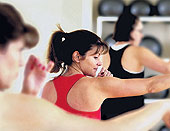 |
It’s just so unfair ? you’ve spent yet another virtuous week training daily at the gym and still the scales have not budged.
But could you be unwittingly sabotaging all your efforts by overeating after exercise? US research suggests, the harder the workout, the more calories women are likely to consume. In fact, a more relaxed approach to exercise could result in faster weight loss in the long term.
In a study carried out at the University of Ottawa and published in The American Journal of Clinical Nutrition, women were invited to eat as much as they wanted at a buffet lunch after a morning gym session of between 60 and 90 minutes.
The women, all lean and fit, were also allowed an unlimited number of snacks. Those who pushed themselves to the limit in high-intensity workouts ? such as running at a pace too great to hold a conversation, or high-impact aerobics ? gobbled up “in excess of 90 per cent of the calories they had just burnt” in the post-workout meal.
Most of the calories ? nearly 900 ? that they ingested came from fat.
Men are from Mars
Conversely, says Professor Eric Doucet, who led the research at Ottawa University’s school of human kinetics, those who adopted a more leisurely approach in a low-to-moderate-intensity exercise ? brisk walking, aqua-aerobics and stretch-and-tone classes ? replaced only about a third of the calories they had used during their gym session.
Though there is, Doucet says, always a “slight shift in metabolism” after physical activity ? it speeds up ? he believes that this change is not enough to balance out for the excess food eaten after a tough workout. He adds: “Women just need to be aware of the fact that, after high-intensity exercise, they might be tempted to consume more.”
Separate studies on men, conducted by the Ottawa team and others, have shown that the type and duration of a workout appears to have no influence on men’s appetite or calorie intake ? suggesting that this particular catch-22 situation is peculiar to female gymgoers. It could, says Doucet, explain why “in a weight-loss programme, men seem to respond better to exercise treatment than women”.
British experts agree that men and women respond differently to the energy demands of exercise. Dr Neil King, a biopsychology researcher at the University of Leeds, who has published numerous papers on the effect of exercise on appetite, says that women tend to reward themselves with fatty foods. “Literature reviews on this subject suggest that female exercisers are possibly more vulnerable to overcompensating on calories than males,” he explains. “That, combined with the fact that they tend to hold on to their fat stores, means that they have more difficulty losing weight.”
Being active is the key
In one study, King and his colleagues showed that women find that fatty foods “taste more palatable after a workout” than at other times.
Dr James Stubbs, of the Rowett Research Institute in Aberdeen, who is working with King on a research project funded by the Biotechnological and Biological Sciences Research Council, says, however, that both men and women are sometimes guilty of “overestimating the calories burnt” during exercise.
It is especially true for newcomers to exercise, who compare the effects of what seems a strenuous workout with their previously sedentary lifestyle. But a man weighing 89kg (14 stone) who walks 2 km (1 mile) in half an hour will burn only about 100 calories, about the amount found in a chocolate digestive biscuit.
If you want to lose weight, Doucet recommends avoiding commercial “energy” bars and “sports” drinks that are high in sugar and calories. Steer clear of high-fat snacks such as biscuits, crisps and chocolate, which he says will undercut “what you have done during exercise”. Instead, quench your thirst with water and refuel with bananas, dried fruit or a bowl of porridge.
It is important to drink and eat something after a hard workout. Jane Griffin, a sports dietician who has worked as a consultant to Britain’s Olympic teams, says: “Ideally, you should consume a high-carbohydrate, low-fat snack within two hours of finishing to top up the body’s glycogen stores. This will enable the muscles to recover fully.”
You may wonder whether, if less exercise means more weight loss, no exercise means even more? Apparently not. When subjects in the Ottawa trial were asked to complete a control session of no activity and then invited to the same buffet lunch, they consumed more than they did after any kind of workout.
The researchers concluded: “Being active always beats sedentary living in the race for weight loss.”










